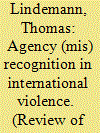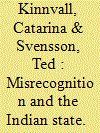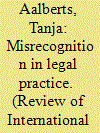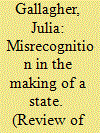|
|
|
Sort Order |
|
|
|
Items / Page
|
|
|
|
|
|
|
| Srl | Item |
| 1 |
ID:
162496


|
|
|
|
|
| Summary/Abstract |
This contribution introduces a reconceptualisation of misrecognition that stresses ‘creative agency’ (gift, work, etc.) as a condition of self-consciousness. Drawing on Hegel’s The Phenomenology of Spirit, I argue that recognition struggles are often less motivated by the actors’ desire to have a special status than by the desire to make a ‘contribution’ to society, to ‘give’ something. The content of a socially valued contribution-gift (as per Marcel Mauss) varies from one society to another but it is linked to the very ability of actors to act on their ‘own’ and to shape their environment. Thus, subjects identifying with political units or social groups with little recognised agency, while imagining strong abilities to contribute to a given society, will easily feel slighted. It is impossible to be recognised as ‘subjects’ if one is denied in the ability to ‘contribute’ to a given society. I apply this perspective to the case of French jihadism, based on 13 interviews with prisoners in France suspected to belong to al-Qaeda or the Islamic State. These individuals experience ‘individual’ agency denial inside the ‘national’ community, but also agency denial of ‘Muslim sovereignty’ outside.
|
|
|
|
|
|
|
|
|
|
|
|
|
|
|
|
| 2 |
ID:
162488


|
|
|
|
|
| Summary/Abstract |
In this article, the introduction to this Special Issue, we underline the importance of the dynamics of misrecognition for the study of world politics. We make the case for shifting the focus from ‘recognition’, where it has long been cast in social, political and, more recently, International Relations theory, to misrecognition. We do so by returning to the original theorisation of misrecognition, Hegel’s dialectic of the master and servant. Our point of departure is not only that the desire for recognition is key social dynamic, but that the failure to obtain this recognition is built into this very desire. It is a crucial factor for understanding how international actors behave, including, but not only, states.
Thus understood, the desire for recognition is not simply a desire for social goods, for status or for statehood, but for more agency – more capacity to act. We explore the logic of misrecognition and show how the international system is a symbolic structure that is ordained by an unrealisable ideal of what we call ‘sovereign agency’.
|
|
|
|
|
|
|
|
|
|
|
|
|
|
|
|
| 3 |
ID:
162494


|
|
|
|
|
| Summary/Abstract |
A focus on misrecognition allows us to move between levels of analysis in a holistic fashion. If misrecognition works through the conscious and the unconscious we can account for the many overlapping insecurities and securities believed to exist at the individual, group, or state level – and thus felt. These insecurities also present themselves through the categories used to describe them and the policies through which they become materialised, technologised, and depoliticised, often by closing down discursive boundaries. Lacan’s concepts of desire, real and lack are here important for understanding the impossibility of recognising something that cannot be recognised. Hence, a perspective that takes misrecognition not as an end result or as failed attempts to reformulate the exceptional as the normal, has the potential to rethink the political subject. In empirical terms, the article discusses how this process of misrecognition has been shaped in the Indian context of postcolonial state formation and articulations of sovereignty. We show how the Indian state is being rethought, restructured, and reimagined through Hindu nationalism and how the concept of misrecognition accounts for desires for sovereign agency and group cohesiveness, but also for resistance to various reimaginations of the Indian state.
|
|
|
|
|
|
|
|
|
|
|
|
|
|
|
|
| 4 |
ID:
162492


|
|
|
|
|
| Summary/Abstract |
This article discusses the concept of misrecognition to analyse international legal ordering in the practice of colonial treatymaking. As critical interventions to the debate on recognition have made clear, recognition is about exclusion as much as it is about inclusion. The most obvious example is the nineteenth-century applications of the standard of civilisation, where the European Family of Nations introduced the criterion of ‘civilisation’, which excluded non-European entities as sovereigns and legitimised their colonisation. But at the same time colonial treaties included the ‘savage rulers’ as signatory powers, and thus legal persons within the international legal order that at once excluded them. This contribution to the Special Issue discusses these treatymaking practices as a practice of misrecognition; not because it misrecognises some natural, essential, or true identity of the indigenous entities, but as a misrecognition of the international order’s own conditions of possibility through practices that simultaneously constitute that order and undermine its constitutive conditions. A rereading of Hegel’s famous master–slave metaphor through the concept of misrecognition sheds light on the reversals and contradictions of the colonial legal enterprise and reveals the aporia of the contemporary international legal order by showing the void at its heart.
|
|
|
|
|
|
|
|
|
|
|
|
|
|
|
|
| 5 |
ID:
162493


|
|
|
|
|
| Summary/Abstract |
This article draws on a Kleinian psychoanalytic reading of Hegel’s theory of the struggle for recognition to explore the role of international misrecognition in the creation of state subjectivity. It focuses on Ghana’s early years, when international relations were powerfully conceptualised and used by Kwame Nkrumah in his bid to bring coherence to a fragile infant state. Nkrumah attempted to create separation and independence from the West on the one hand, and intimacy with a unified Africa on the other. By creating juxtapositions between Ghana and these idealised international others, he was able to create a fantasy of a coherent state, built on a fundamental misrecognition of the wider world. As the fantasy bumped up against the realities of Ghana’s failing economy, fractured social structures, and complex international relationships, it foundered, causing alienation and despair. I argue that the failure of this early fantasy was the start of Ghana’s quest to begin processes of individuation and subjectivity, and that its undoing was an inevitable part of the early stages of misrecognition, laying the way for more grounded struggles for recognition and the development of a more complex state-subjectivity.
|
|
|
|
|
|
|
|
|
|
|
|
|
|
|
|
| 6 |
ID:
162490


|
|
|
|
|
| Summary/Abstract |
The symbolic structure of the international system, organised around sovereignty, is sustained by an institutional infrastructure that shapes how states seek sovereign agency. We investigate how the modern legal category of the state is an institutional expression of the idea of the state as a liberal person, dependent on a one-off recognition in establishing the sovereign state. We then discuss how this institutional rule coexists with the ongoing frustrated search for recognition in terms of sociopolitical registers. While the first set of rules establishes a protective shield against others, regardless of behaviour, the second set of rules specify rules for behaviour of statehood, which produces a distinct form of misrecognition. States are, at one level, already recognised as sovereign and are granted rights akin to individuals in liberal thought, and yet they are continually misrecognised in their quest to actualise the sovereign agency they associate with statehood. We draw on examples from two contemporary phenomena – fragile states, and assertions of non-interference and sovereignty from the populist right and non-Western great powers, to discuss the misrecognition processes embedded in the bifurcated symbolic structure of sovereignty, and its implications for debates about hierarchy and sovereignty in world affairs.
|
|
|
|
|
|
|
|
|
|
|
|
|
|
|
|
|
|
|
|
|